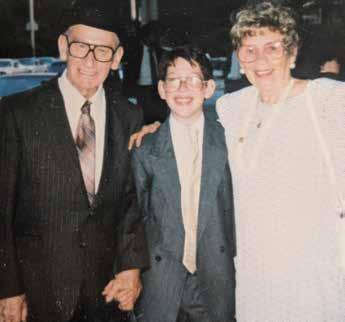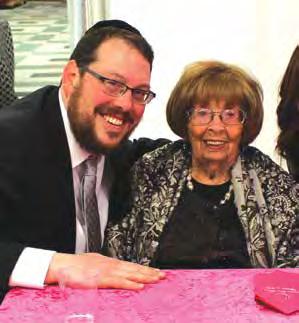
5 minute read
My Personal Holocaust Memorial Day by Rabbi Baruch Fogel
Jewish History
My Personal Holocaust Memorial Day
By Rabbi Baruch Fogel
With my grandparents

There has been much debate how best to remember and memorialize the Holocaust as a community. Some have chosen to focus on Tisha B’Av, while others fo cus on Yom Hashoah or Kristallnacht. Whatever day each individual community chooses, we are all in agreement that it is important for each person to internalize what the Holocaust means to them. I think that it is also appropriate for each person, if pos sible, to find a day that has specific meaning for them and their family and use that as a day of reflection so that the meaning and the lesson of the A recent photo of my grandmother and me
Holocaust remains alive for the next generation.
As a grandchild of survivors of Auschwitz, and a great-grandchild of many great-grandparents murdered in Auschwitz, there are many days throughout the year that I could have chosen. As a family, we commemorate the day(s) that my great-grandparents, with their young children, were taken to the gas chambers. I grandmother, Yolan Altman (née Riedermann), a survivor of Auschwitz, is still alive. As her oldest grandchild, we share a very special bond and relationship that contin
could choose to commemorate the day(s) of liberation. But I chose August 1 as a commemoration to the Holocaust because of a unique document that haunts me constantly.
I am blessed that my maternal ues until this day. In 1997, she courageously gave her testimony to the USC Shoah Foundation detailing her personal Holocaust story. Though she did not talk about it much with us, throughout the years I was able to hear snippets of information that helped me paint a better picture of all that she suffered and experienced. One story that she told often has particular meaning as we approach the fast day of Tisha B’Av. She always told us that even though she was starving in Auschwitz, she nevertheless resolved to fast on Tisha B’Av to commemorate the destruction of the Holy Temple almost 2,000 years ago. Being that she was a Hungarian, and that Hungarians were only rounded up in the spring of 1944, she had only been in Auschwitz for a couple of months when Tisha B’Av (July 29, 1944) occurred. She was approached by women from Poland and Lithuania who had been in Auschwitz for a number of years who derided her decision to fast on that day. And yet, she resolutely refused to eat, saying
that even though they were starving, she would not let the Nazis take her religion away from her as well.
I chose August 1 to commemorate the Holocaust because of a document I recently found. When the Arolsen Archives were opened online to the public, I thought it would be interesting to see if there were any documents that mentioned my family members. I was not sure what I was looking for, as I thought I knew all the details about my grandparents and great-grandparents from our family’s oral history. But what I found regarding my grandmother (after trying numerous spellings) blew my mind. At first, I felt lucky just to find something. But, after internalizing what the document means, I cannot stop reflecting on the importance of what I had found. I found my grandmother’s entry form to Dachau. On August 1, 1944, Yolan Riedermann entered Konzentrationslager Dachau. (According to her testimony, she was taken to Landsberg, which refers to the Kaufering system of Dachau subcamps.) The form lists her date of birth, her place of birth, who her parents were, her religion and race (Jud.). It also detailed her weight, nose (shape), hair (color), mouth, ears, eyes, teeth, and shape (gestalt). It mentioned which ghetto she originated from (Kisvarda) and that she arrived after coming from Kl. Auschwitz. Lastly, on the bottom, is her signature!
Every time I look at this document, I see my grandmother’s whole Holocaust story encapsulated on one page. It mentions the ghetto where her family was rounded-up to, Auschwitz where her mother and siblings were murdered, and Dachau, where she was sent as a forced laborer, helping maintain the crumbling German infrastructure at the end of World War II. I also see the unfathomable meticulousness and cruelty of the Nazis. Their intent to systematically destroy all Jews is apparent in their need to label every body part as being identifiably Jewish. Lastly, I cannot fathom their cruelty in having her sign her entry papers into Dachau!
However, I also note that she was sent from Auschwitz on August 1, which was merely three days after she had fasted on Tisha B’Av. Her stay in Auschwitz was relatively brief, as she was lucky enough to be selected for forced labor and sent to a work-camp. Though she could not have known it when she decided to fast, her faith in not giving in was repaid, as she was able to survive Auschwitz, survive forced labor, eventually survive the war, and come to America where she, with my grandfather, raised a beautiful family.
Seventy-six years later, on this Tisha B’Av, and on August 1, as I called to wish her a good Shabbos, I commemorated my personal Holocaust memorial day. I will remember all of my relatives who perished. I will thank G-d for allowing me to still have my grandmother with us so that my children can love and appreciate their great-grandmother. And I will remember that her faith that carried her through Auschwitz will forever be with me and with the eternal Jewish People.
Rabbi Baruch Fogel is the campus rabbi at Touro Law School and a professor in the NYSCAS division of Touro College. He lives in Lawrence with his wife and four daughters.
!!! ד " סב
חצרת אל DON’T MURDER!!!
Texting while driving
Texting while driving
the last few years.
kills! has caused the death of many in
It It is is extremely, prohibited extremely dangerous.
by law everywhere.

Because of actual tragedies, Rabbonim and Poskim shlit"a have ruled that anyone that texts while driving - even momentarily - is transgressing a severe prohibition as outlined in the Rivash and R. Akiva Eiger (Yoreh Deah 334:43) putting him/herself automatically into the category of nezifa and niduy (excommunication) יודנו הפיזנ until such activities are stopped. There are no circumstance or emergency that allows it. This is a grave matter that must be treated with

utmost seriousness by every
accepts this will be blessed. G-d fearing Jew, anyone who










